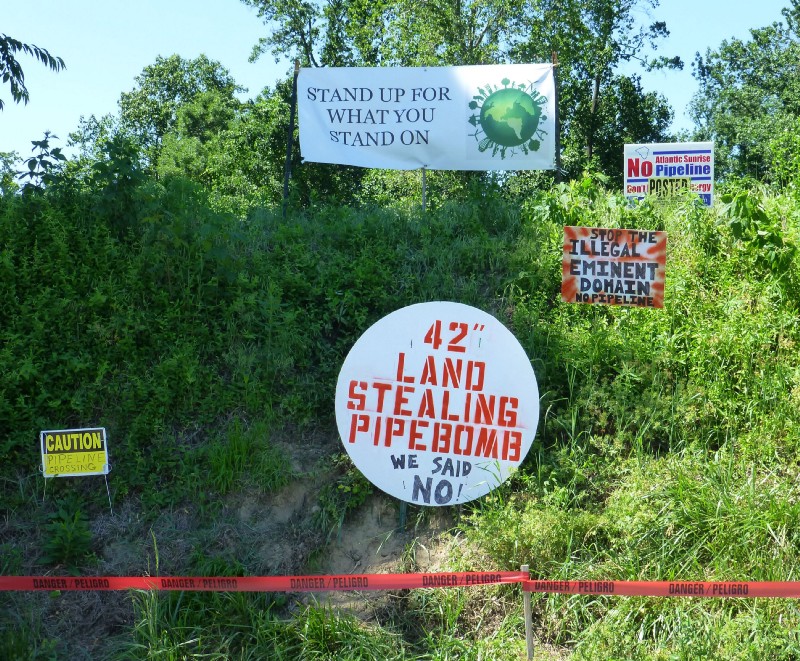The D.C. Circuit Court of Appeals issued a decision Tuesday that forces the Federal Energy Regulatory Commission (FERC) to reconsider the environmental impacts of the Sabal Trail pipeline and two related pipeline projects that run from Alabama to Florida.
In a case brought by the Sierra Club and two local environmental groups, a panel of three judges ruled that FERC had failed in its Environmental Impact Statement (EIS) to adequately consider the greenhouse gas emissions from power plants that will be served by the natural gas pipeline.
“We conclude that the EIS for the Southeast Market Pipelines Project should have either given a quantitative estimate of the downstream greenhouse emissions that will result from burning the natural gas that the pipelines will transport or explained more specifically why it could not have done so,” Judges Judith Rogers and Thomas Griffith wrote. “As we have noted greenhouse-gas emissions are an indirect effect of authorizing this project, which FERC could reasonably foresee, and which the agency has legal authority to mitigate.” A third judge, Janice Rogers Brown, dissented.
The Certificate of Public Convenience and Necessity for the project, which authorized its construction, has been vacated and remanded to FERC while the agency reviews the EIS in light of the decision.
“Today’s decision requires FERC to fulfill its duties to the public, rather than merely serve as a rubber stamp for corporate polluters’ attempts to construct dangerous and unnecessary fracked gas pipelines,” Sierra Club attorney Elly Benson said in a statement.
“FERC would like to say, ‘We’re approving the pipeline. Here are the impacts of digging a trench and laying a pipe,’ but that’s not what federal law requires,” Benson explained on the phone. “FERC is well aware that this 1.1 billion cubic feet of gas a day is going to be burned at power plants. That is not speculative.”
Under the National Environmental Policy Act (NEPA), federal agencies are required to consider the environmental impacts of major projects, as well as any related actions the project’s will trigger.
The case was one in a slew of cases that the Sierra Club and others have brought against FERC, challenging the agency’s environmental analyses. Challenges to FERC’s failure to examine the greenhouse gas emissions related to natural gas export facilities failed when the court ruled that export terminals were the purview of the Department of Energy. At least three cases against the Department of Energy’s permits are awaiting either hearings or decisions.
But this is the first case to successfully challenge FERC’s greenhouse gas emissions analysis — and it could have repercussions up and down the East Coast. There are currently hundreds of miles of proposed pipeline on FERC’s docket or under construction, including the Atlantic Sunrise Pipeline, the Atlantic Coast Pipeline, and the Rover Pipeline. Since the Marcellus shale boom in Ohio, Pennsylvania, and West Virginia, natural gas developers have been seeking ways to move the gas to population hubs from Massachusetts to Florida.
But a report by Oil Change International in 2016 found that if all the proposed natural gas pipelines were approved and became operational, the related infrastructure and combustion would produce enough emissions to prevent the United States from meeting its obligations under the Paris climate accord. (President Donald Trump has subsequently announced that the United States would withdraw from the landmark 2015 agreement to reduce emissions in an effort to prevent 2°C global warming and the catastrophic effects that will come with it.) Natural gas is 80 percent methane, a potent greenhouse gas, which traps heat 86 times more effectively than CO2 over a 20-year span. Advocates for natural gas tout the fact that it burns nearly twice as cleanly as coal, but leakage from drilling and transportation operations have been estimated to more than compensate for its cleaner combustion.
It was not immediately clear what would happen with the Sabal pipeline and the two related projects, which all began operating in July.
FERC declined to outline next steps, saying it is agency policy “not to comment on court cases.” Requests for comment from project developers Next Era Energy and Spectra Energy Partners were not returned Tuesday afternoon.
A spokeswoman for the project told the Miami New Times that “the court’s decision will not affect… operations at this time.”

